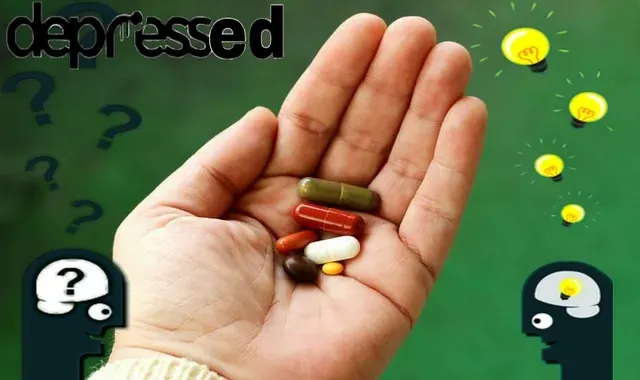Hello, in this article, we will explore the top 10 of best antidepressant for anxiety and depression that provide effective relief from their bothersome symptoms, ultimately improving the lives of individuals. We encourage you to continue reading this article until the end as it presents the best antidepressant for anxiety and depression available in pharmacies under prescription.
 |
| Best antidepressant for anxiety and depression |
Therapy for depression and anxiety with antidepressant
Depression and anxiety are two common mental health conditions that can significantly impact a person's well-being and quality of life.
Depression is characterized by persistent feelings of sadness, hopelessness, and a loss of interest or pleasure in activities. It can affect various aspects of life, including sleep, appetite, energy levels, and concentration. Depression often leads to a lack of motivation and can interfere with daily functioning. It is essential to seek professional help for an accurate diagnosis and appropriate treatment, which may include therapy, medication, or a combination of both.
Anxiety, on the other hand, is characterized by excessive worry, fear, and apprehension. It can manifest as physical symptoms such as rapid heartbeat, sweating, trembling, and difficulty breathing. Anxiety disorders encompass various conditions, including generalized anxiety disorder (GAD), panic disorder, social anxiety disorder, and specific phobias. Anxiety can be disruptive and impact daily activities, relationships, and overall well-being. Treatment options for anxiety include therapy, medications, stress management techniques, and lifestyle changes.
Depression and anxiety often coexist and can mutually influence each other. They share common risk factors, such as genetics, brain chemistry imbalances, environmental factors, and life events. Both conditions can be treated effectively with the help of mental health professionals who can provide appropriate interventions and support. It's crucial to remember that seeking help is a sign of strength, and early intervention can lead to better outcomes for individuals dealing with depression and anxiety.
Best antidepressant to dealing with depression and anxiety
01) Fluoxetine: Fluoxetine is a selective serotonin reuptake inhibitor (SSRI) commonly prescribed for the treatment of depression, obsessive-compulsive disorder (OCD), bulimia nervosa, and panic disorder. It works by increasing the levels of serotonin in the brain, which helps improve mood and reduce symptoms of depression. Fluoxetine is available in tablet and capsule forms. Common side effects may include nausea, insomnia, headache, and sexual dysfunction.
02) Escitalopram: Escitalopram is another selective serotonin reuptake inhibitor (SSRI) used to treat depression and anxiety disorders, including generalized anxiety disorder (GAD). It works by increasing serotonin levels in the brain. Escitalopram is available in tablet and oral solution forms. Common side effects may include nausea, drowsiness, insomnia, and sexual dysfunction.
03) Nortriptyline: Nortriptyline is a tricyclic antidepressant (TCA) primarily used to treat depression. It works by increasing the levels of serotonin and norepinephrine in the brain. Nortriptyline is also sometimes used for other conditions like neuropathic pain. It is available in tablet and capsule forms. Common side effects may include dry mouth, constipation, blurred vision, dizziness, and weight gain.
04) Phenelzine: Phenelzine is a monoamine oxidase inhibitor (MAOI) used for the treatment of depression. It works by increasing the levels of certain neurotransmitters in the brain, including serotonin, norepinephrine, and dopamine. Phenelzine is usually reserved for individuals who have not responded to other antidepressant medications. Due to potential serious interactions and side effects, it requires strict dietary restrictions and close monitoring. Common side effects may include drowsiness, dizziness, headache, and constipation.
05) Venlafaxine: Venlafaxine is a serotonin-norepinephrine reuptake inhibitor (SNRI) used for the treatment of depression, generalized anxiety disorder (GAD), and panic disorder. It works by increasing the levels of both serotonin and norepinephrine in the brain. Venlafaxine is available in immediate-release and extended-release capsule forms. Common side effects may include nausea, drowsiness, insomnia, sweating, and changes in blood pressure.
06) Desipramine: Desipramine is a tricyclic antidepressant (TCA) that is primarily used to treat depression. It works by increasing the levels of norepinephrine in the brain. Desipramine is available in tablet and extended-release capsule forms. It may also be used for conditions such as attention deficit hyperactivity disorder (ADHD) and chronic pain. Common side effects may include dry mouth, constipation, blurred vision, dizziness, and weight changes.
07) Duloxetine: Duloxetine is a serotonin-norepinephrine reuptake inhibitor (SNRI) used to treat major depressive disorder, generalized anxiety disorder (GAD), fibromyalgia, and chronic musculoskeletal pain. It works by increasing the levels of serotonin and norepinephrine in the brain. Duloxetine is available in delayed-release capsule form. Common side effects may include nausea, drowsiness, dizziness, constipation, and sweating.
08) Trazodone: Trazodone is an atypical antidepressant that is primarily used to treat major depressive disorder. It works by increasing serotonin levels and blocking certain serotonin receptors in the brain. Trazodone is also commonly prescribed off-label for the treatment of insomnia due to its sedating effects. It is available in tablet and extended-release tablet forms. Common side effects may include drowsiness, dry mouth, dizziness, blurred vision, and constipation.
09) Paroxetine: Paroxetine is a selective serotonin reuptake inhibitor (SSRI) used to treat depression, generalized anxiety disorder (GAD), panic disorder, and social anxiety disorder. It works by increasing serotonin levels in the brain. Paroxetine is available in tablet and suspension forms. Common side effects may include nausea, drowsiness, insomnia, sexual dysfunction, and weight changes.
10) Citalopram: Citalopram is a selective serotonin reuptake inhibitor (SSRI) commonly prescribed for the treatment of depression and anxiety disorders, including panic disorder and obsessive-compulsive disorder (OCD). It works by increasing serotonin levels in the brain. Citalopram is available in tablet and oral solution forms. Common side effects may include nausea, drowsiness, insomnia, and sexual dysfunction.





